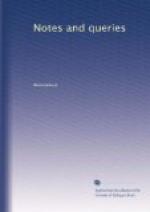Their doings in the bay are then narrated, and from page 738. I extract the following:—
“When they [the natives with their king] had satisfied themselves [with dancing, &c.] they made signes to our General [Drake] to sit downe, to whom the king and divers others made several orations, or rather supplications, that hee would take their province or {337} kingdom into his hand, and become their king, making signes that they would resigne unto him their right and title of the whole land, and become his subjects. In which, to persuade us the better, the king and the rest with our consent, and with great reverence, joyfully singing a song, did set the crowne upon his head, inriched his necke with all their chaines, and offred unto him many other things, honouring him by the name of Hioh, adding thereulto, as it seemed, a sign of triumph; which thing our Generall thought not meet to reject, because he knew not what honour and profit it might be to our countrey. Whereupon, in the name and to the use of Her Majestie, he took the scepter, crowne, and dignitie of the said country into his hands, wishing that the riches and treasure thereof might so conveniently be transported to the inriching of her kingdom at home, as it aboundeth in ye same.
“Our Generall called this countrey Nova Albion, and that for two causes; the one in respect of the white bankes and cliffes, which lie towards the sea, and the other, because it might have some affinities with our countrey in name, which sometime was so called.”
Then comes the curious statement:
“There is no part
of earth heere to be taken up, wherein there is not
some probable show of gold
or silver.”
The narrative then goes on to state that formal possession was taken of the country by putting up a “monument” with “a piece of sixpence of current English money under the plate,” &c.
Drake and the bold cavaliers of that day probably found that it paid better to rob the Spaniard of the gold and silver ready made in the shape of “the Acapulco galleon,” or such like, than to sift the soil of the Sacramento for its precious grains. At all events, the wonderful richness of the “earth” seems to have been completely overlooked or forgotten. So little was it suspected, until the Americans acquired the country at the peace with Mexico, that in the fourth volume of Knight’s National Cyclopaedia, published early in 1848, in speaking of Upper California, it is said, “very little mineral wealth has been met with”! A few months after, intelligence reached Europe how much the reverse was the case.
T.N.
* * * * *
THE DISPUTED PASSAGE PROM THE TEMPEST.
(Vol. ii., pp. 259. 299.)
When the learning and experience of such gentlemen as MR. SINGER and MR. COLLIER fail to conclude a question, there is no higher appeal than to plain common sense, aided by the able arguments advanced on each side. Under these circumstances, perhaps you will allow one who is neither learned nor experienced to offer a word or two by way of vote on the meaning of the passage in the Tempest cited by MR. SINGER. It appears to me that to do full justice to the question the passage should be quoted entire, which, with your permission, I will do.




